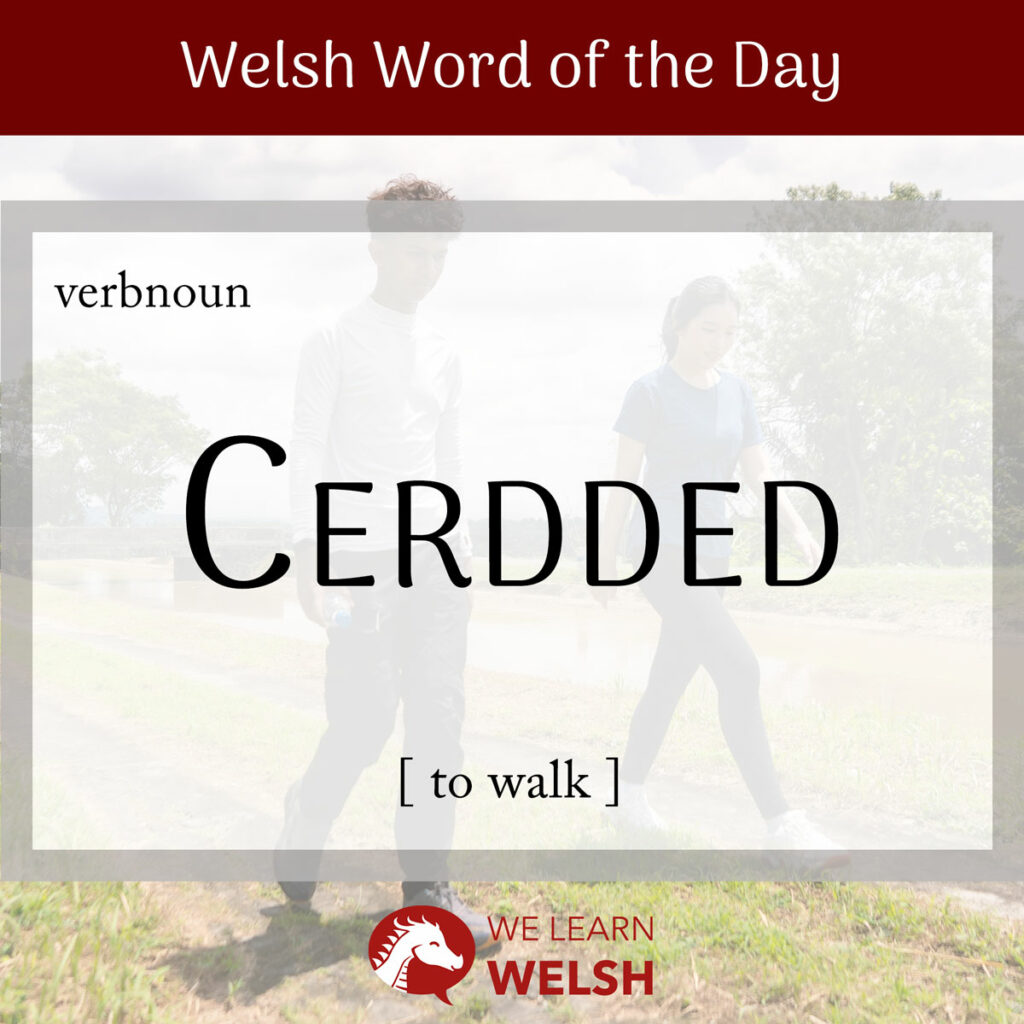One of the top attractions of Cymru (Wales) as a holiday destination, or a place to build a home, has got to be all the amazing cerdded (walking) that you can do!
Whether it’s the awe-inspiring peaks of Eryri (Snowdonia) and y Bannau Brycheiniog (the Brecon Beacons), or the picturesque clifftops of Wales’ 1,700 miles of coastline, cerdded has got to be the best way to experience this stunning country. So why not learn how to use the word?
cerdded
to walk
Cerdded is an amazing word because it has cousins all over the world! It comes from the proto-Celtic *kerdeti, but that in itself is a direct descendant of the proto-Indo-European *(s)kerd, meaning to swing or to move. This means it’s related to words as distant as the Icelandic hrata (to hurry), the Hindi-Urdu kudna (to jump), and the Greek kradaino (to brandish).
The fact that it starts with the letter c also brings complexities, as this is one of the three letters in yr wyddor Gymraeg (the Welsh alphabet) that is subject to all three kinds of mutations.
Soft mutation
gerdded
Nasal mutation
ngherdded
Aspirate mutation
cherdded
However, I can’t think of any context in which you’d actually ever need to use the nasal mutation of cerdded, so learning the other two is a higher priority. You would say, for example, rhedeg a cherdded (running and walking), using the aspirate mutation, or hanner awr o gerdded (half an hour of walking), using the soft mutation.
This word isn’t used as a noun, like walk is in English. The most direct translation of walk as a noun is taith gerdded (a walking journey), and this is the term you would use if you wanted to describe a beautiful walk you wanted to do through Cwm Elan (Elan Valley), or along the Llwybr Arfordir Ceredigion (Ceredigion Coastal Path).
Although taith gerdded often comes in very handy as a phrase, personally, I find it a bit clunky for everyday use. If I was talking about just going for a walk, I would definitely say mynd am dro.
Here, dro is a soft mutation of tro, which means a turn. We use it, though, to mean going for a short walk or stroll. It could also describe going for a spin in a car – it’s not exclusive to cerdded.
As with any other verb in Welsh, the infinitive form is always paired with the particle yn. While yn doesn’t have a direct equivalent in English, it plays a crucial role in Welsh by linking bod (to be) and its various forms—such as mae, rwyt, and others—to the verbnoun in a sentence. For simplicity, it can help to think of yn as a “link word.”
So, for example:
Mae hi’n cerdded bob dydd.
She walks every day.
In this phrase, mae is the present-tense, third person conjugation of bod, which means to be. It’s really very like the English is. Hi’n is a contraction of hi and yn, where hi means she. Yn functions as a link between mae and the verb cerdded, which means to walk.
Remember that yn has two usages in Welsh. One is the linking function, as described above. This causes a soft mutation to adjectives and nouns, but not to verbs (which is why cerdded hasn’t mutated in this phrase). The other means in, and it causes a nasal mutation. For example, yn Nhregaron (in Tregaron).
If you want to use cerdded in different tenses and for different subjects, you can pair it with the auxiliary verb gwneud (to do). For example, here is the past tense in the second person formal:
Wnaethoch chi gerdded i’r siop.
You walked to the shop.
This literally means you did walk, but in Welsh this is synonymous with you walked. The word wnaethoch is the second-person formal, past-tense conjugation of gwneud.
It’s also been affected by a soft mutation, which is why it’s wnaethoch, not gwnaethoch. The soft mutation has happened here because if we were speaking formally, we would include an extra particle at the beginning of the phrase – either fe or mi.
Mi and fe don’t really add any extra information, which is why they’re usually dropped in colloquial speech. But we tend to retain the mutation it would have caused.
The word chi just means you when you’re being formal or when you’re talking to more than one person, and of course, gerdded is the soft mutation of cerdded. The direct object of a conjugated verb (like gwnaethoch / wnaethoch) takes a soft mutation, and in this case, cerdded is the object of the verb, so it becomes gerdded.
Mae’n well gen i gerdded adre.
I prefer to walk home.
Forming a verb with an auxiliary verb and a verbnoun, rather than through inflection alone, is known as periphrastic conjugation, and it’s very common in Welsh. English also uses this for certain tenses—for example, we always say we will walk rather than having a special future tense form of walk.
However, Welsh also allows direct verb conjugation (in this case, cerdded), and mastering this can add variety and fluency to your speech. Fortunately, most Welsh verbs follow regular conjugation patterns, making them easier to learn.
Here are the most useful colloquial conjugations of cerdded:
| Future | Conditional | Past | |
| First person singular | Cerdda(f) i I will walk | Cerddwn i I would walk | Cerddais i I walked |
| First person plural | Cerddwn ni We will walk | Cerdden ni We would walk | Cerddon ni We walked |
| Second person singular / informal | Cerddi di You will walk | Cerddet ti You would walk | Cerddaist ti You walked |
| Second person plural / formal | Cerddwch chi You will walk | Cerddech chi You would walk | Cerddoch chi You walked |
| Third person singular | Cerddith / cerddiff o/e/hi He/she will walk | Cerddai fo/fe/hi He/she would walk | Cerddodd o/e/hi He/she walked |
| Third person plural | Cerddan nhw They will walk | Cerdden nhw They would walk | Cerddon nhw They walked |
Of course, there are plenty of other words to describe moving by foot, at various speeds and in various styles. Why not try using one of the following?
- rhedeg = to run
- rhodio = to walk / to wander (literary)
- crwydro = to wander
- heicio = to hike
- gwibio = to sprint
- cerdded wrth eich pwysau = to amble (literally, to walk by your weight)
- camu = to step
- troedio = to tread / to trudge
- loncian = to jog
- mynd yn ling-di-long = to saunter along
One I particularly like is cydgerdded. The prefix cyd– refers to things done jointly in Welsh, so this means to walk together. Why not find a friend or family member you like to cydgerdded â (walk with) and plan a taith gerdded around Wales this summer? 😉


